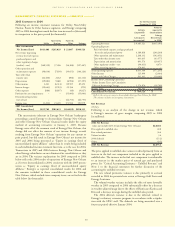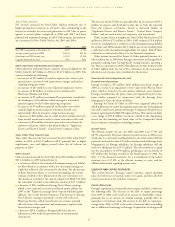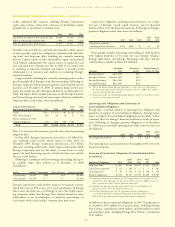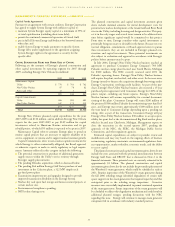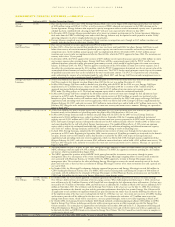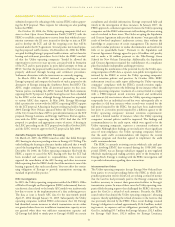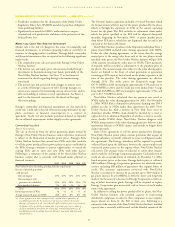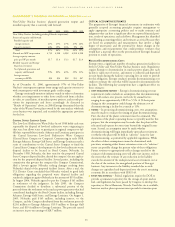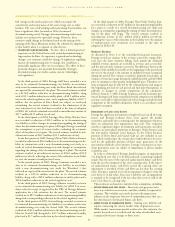Entergy 2006 Annual Report Download - page 56
Download and view the complete annual report
Please find page 56 of the 2006 Entergy annual report below. You can navigate through the pages in the report by either clicking on the pages listed below, or by using the keyword search tool below to find specific information within the annual report.
ENTERGY CORPORATION AND SUBSIDIARIES 2
2000066
40
this time its jurisdiction over the matters raised by the complaint and
further that the retail regulators are not preempted from exercising
jurisdiction over those same production costs that are being consid-
ered in the proceeding. In October 2006, the Utility operating
companies filed an answer to the other parties’ September 2006 com-
ments. In the October 2006 answer, the Utility operating companies
explain, among other things, that the FERC must address the juris-
dictional issues raised by the parties to the proceeding and that the
LPSC’s and APSC’s view concerning jurisdiction and preemption are
inconsistent with federal law and regulation.
LPSC System Agreement Complaint at the FERC
On December 18, 2006, the LPSC filed a complaint requesting the
FERC “immediately institute a proceeding to determine whether, and
on what terms, [Entergy Arkansas] may withdraw” from the System
Agreement. The complaint alleges that “safeguards must be adopted
to ensure that the remaining operating companies and their customers
are protected from adverse effects of the termination attempt of
[Entergy Arkansas].” The LPSC requests that the FERC (1) investi-
gate the effect that Entergy Arkansas’ notice of termination will have
on the rates, charges, and billings under the System Agreement and
the capacity and production costs of the remaining Utility operating
companies and adopt remedies that are just and reasonable; and
(2) provide for the continuation of the bandwidth payments by
Entergy Arkansas, require Entergy Arkansas provide “generating
capacity or wholesale power contracts to Entergy Louisiana and
Entergy Gulf States-Louisiana sufficient to satisfy the rough produc-
tion cost equalization requirements established in the System
Agreement orders, or require “hold harmless protection be put in
place to prevent any harm to [Entergy Louisiana] and [Entergy Gulf
States-Louisiana] as a result of the impact of [Entergy Arkansas’] ter-
mination.” The LPSC complaint further urges the FERC to find that
“Entergy controls the actions of [Entergy Arkansas] and is responsible
for and liable for any damages caused and remedies required due to
[Entergy Arkansas’] termination.” The Utility operating companies
filed a response to the LPSC complaint on January 31, 2007 explain-
ing that the System Agreement explicitly provides each Utility
operating company the unilateral right to terminate its participation
in the System Agreement upon 96 months written notice to the other
Utility operating companies. This right is absolute and unambiguous
and is not conditioned or limited in any way, as the LPSC’s complaint
would suggest. The unilateral right to terminate has been in the
System Agreement at least since 1973 and the agreement has been lit-
igated before the FERC by the LPSC on numerous occasions. At no
point has the LPSC raised this issue nor has the FERC determined the
termination provision to be unjust or unreasonable.
MPSC System Agreement Inquiry
In response to an inquiry from the MPSC, Entergy Mississippi
advised the MPSC of its view that it would be premature to decide at
this time whether to terminate Entergy Mississippi’s participation in
the current System Agreement. Entergy Mississippi indicated that it
would report to the MPSC during the first quarter of 2007 regarding
its continuing evaluation of the issues concerning Entergy
Mississippi’s participation in the current System Agreement.
Independent Coordinator of Transmission
In 2000, the FERC issued an order encouraging utilities to voluntar-
ily place their transmission facilities under the control of independent
RTOs (regional transmission organizations) by December 15, 2001.
The FERC issued this order after previously requiring that utilities file
an open access transmission tariff to implement the federal mandate
to offer unused transmission capacity to the wholesale power market-
place on a nondiscriminatory basis. Delays in implementing the
FERC RTO order have occurred due to a variety of reasons, includ-
ing the fact that utility companies, other stakeholders, and federal and
state regulators continue to work to resolve various issues related to
the establishment of such RTOs.
In November 2006, after years of filings, orders, technical confer-
ences, and proceedings at the FERC, the Utility operating companies
installed the Southwest Power Pool (SPP) as their Independent
Coordinator of Transmission (ICT). The installation does not trans-
fer control of Entergy’s transmission system to the ICT, but rather
vests with the ICT responsibility for:
■granting or denying transmission service on the Utility operating
companies’ transmission system.
■administering the Utility operating companies’ OASIS node for
purposes of processing and evaluating transmission service
requests and ensuring compliance with the Utility operating
companies’ obligation to post transmission-related information.
■developing a base plan for the Utility operating companies’
transmission system that will result in the ICT making the
determination on whether costs of transmission upgrades should
be rolled into the Utility operating companies’ transmission rates
or directly assigned to the customer requesting or causing an
upgrade to be constructed. This should result in a transmission
pricing structure that ensures that the Utility operating
companies’ retail native load customers are required to pay for
only those upgrades necessary to reliably serve their needs.
■serving as the reliability coordinator for the Entergy transmission
system.
■overseeing the operation of the weekly procurement process
(WPP).
■evaluating interconnection-related investments already made on the
Entergy System for purposes of determining the future allocation of
the uncredited portion of these investments, pursuant to a detailed
methodology. The ICT agreement also clarifies the rights that
customers receive when they fund a supplemental upgrade.
The initial term of the ICT is four years, and Entergy is precluded
from terminating the ICT prior to the end of the four-year period. A
transmission users group has been established that will provide input
directly to the ICT. If there is a dispute between the ICT and Entergy
concerning transmission service requests, transmission planning, and
interconnection requests, the ICT’s position will prevail during the
pendency of the dispute resolution. In its April 2006 order approving
Entergy’s ICT proposal, the FERC stated that the WPP must be oper-
ational within approximately 14 months of the FERC order or the
FERC may reevaluate all approvals to proceed with the ICT.
After the FERC issued its April 2006 order approving the ICT pro-
posal, the Utility operating companies made their compliance filing
with the FERC in May 2006, including the executed ICT agreement
with SPP. Several parties filed protests regarding the compliance filing.
In October 2006, the FERC accepted the Utility operating compa-
nies’ compliance filing, with modification, and directed the Utility
operating companies to install SPP as the ICT within 30 days of the
order. As stated above, SPP was installed as the ICT in November
2006. The Utility operating companies filed a request for clarification
with respect to two provisions of the FERC order accepting the com-
pliance filing and several other parties have filed for rehearing of the
FERC’s order. The Utility operating companies submitted a revised
compliance filing implementing the provisions of the FERC’s
October 2006 order. In addition to the requests for rehearing on the
FERC’s order accepting the compliance filing, certain parties have
MANAGEMENT’S FINANCIAL DISCUSSION and ANALYSIS continued


